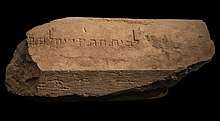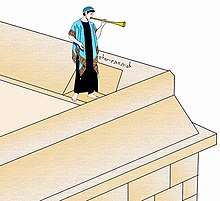Trumpeting Place inscription
The Trumpeting Place inscription is an inscribed stone from the 1st century CE discovered in 1968 by Benjamin Mazar in his early excavations of the southern wall of the Temple Mount. The stone, showing just two complete words written in the Square Hebrew alphabet,[2][3] was carved above a wide depression cut into the inner face of the stone.[4] The first word is translated as "to the place" and the second word "of trumpeting" or "of blasting" or "of blowing", giving the phrase "To the Trumpeting Place". The subsequent words of the inscription are cut off. The third word (...לה), which is incomplete, has been interpreted as either "declare" or "distinguish", giving either: "to d[eclare (the Sabbath)]" or "to d[istinguish (between the sacred and the profane)]", where the words in square brackets represent scholarly conjecture.[2][4][5]
| Trumpeting Place inscription | |
|---|---|
 The Trumpeting Place inscription | |
| Material | Basalt |
| Size | 84 by 31 by 26 centimetres (2 ft 9 in × 1 ft 0 in × 10 in) |
| Writing | Square Hebrew alphabet |
| Created | 1st century CE[1] |
| Discovered | 1968 |
| Present location | Israel Museum |
| Identification | IAA 78-1439 |

It is believed to be a directional sign for the priests who blew a trumpet announcing the beginning and end of the Shabbat in the Second Temple period.[6] It is thought to have fallen from the southwest corner of the Temple Mount to the street below prior to its discovery. It has been connected to a passage in Josephus's The Jewish War (IV, ix, 12) in which he describes a part of the Temple: "the point where it was custom for one of the priests to stand and to give notice, by sound of trumpet, in the afternoon of the approach, and on the following evening of the close, of every seventh day".
Text
| Text | ...לבית התקיעה לה |
| Transliteration | lbyt htqy‘h lh... |
| Romanization | l-beyt ha-taqi‘ah l-h... |
| Possible completion | לבית התקיעה להכריז or לבית התקיעה להבדיל |
| Translation | To the place of trumpeting to d...[eclare?] or To the place of trumpeting to d...[istinguish?] |
Gallery
 Two possible extensions of the inscription
Two possible extensions of the inscription Reconstruction in the Jerusalem Archaeological Park
Reconstruction in the Jerusalem Archaeological Park
See also
- List of artifacts significant to the Bible
References
- Corpus Inscriptionum Iudaeae/Palaestinae, Jerusalem, Part 1, Walter de Gruyter, 2010, ISBN 9783110222203], page 49
- Israel Museum artifact IAA 78-1439
- The writing on the wall, tablet and floor, Haaretz, Ofer Aderet, Mar. 9, 2012
- Site 12: The 'Trumpeting Place' Inscription
- Aaron Demsky (November 1986). "When the Priests Trumpeted the Onset of the Sabbath". Biblical Archaeology Review. Retrieved 9 November 2015.
- Jerusalem Milestones: A guide to the archaeological sites, Ronny Reich, Gideon Avni, Tamar Winter, p. 28
Further reading
| Wikimedia Commons has media related to Trumpeting place. |
- Benjamin Mazar (1978). "Herodian Jerusalem in the Light of the Excavations South and South-West of the Temple Mount". Israel Exploration Journal. 28 (4): 234. JSTOR 27925680.